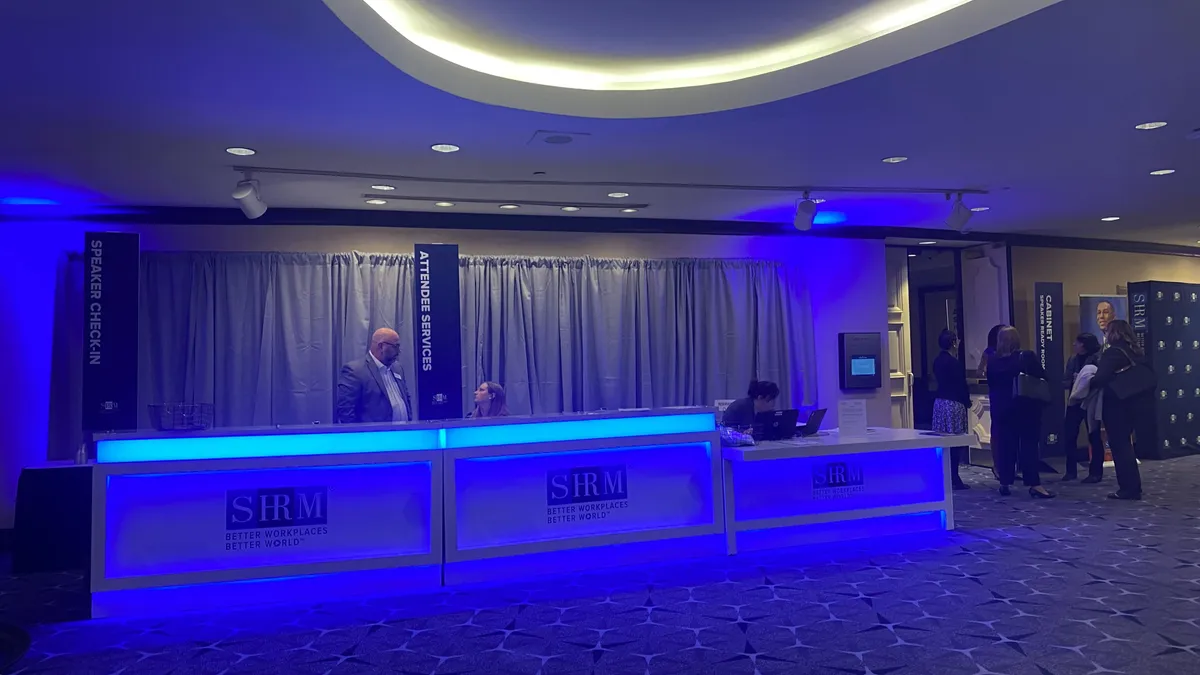Beneath the Washington, D.C., Hilton on Connecticut Avenue is a ballroom with sloping stucco ceilings — a mix of brutalist architecture and '60s space age sensibilities. Last week, HR professionals gathered there for the Society of Human Resource Management's Workplace Policy Conference.
With the ballroom awash in a cool periwinkle glow, tables were spread out across the ballroom like floating spaceships, each with a conference-bound team or a motley crew of quiet strangers. On the conference's final day, attendees gathered for the Future of Equitable Workplaces session to hear what the U.S. Equal Employment Opportunity Commission will be up to in 2022.
Jocelyn Samuels, vice chair of the EEOC, and Andrea Lucas, a commissioner in the same agency, took center stage. Samantha Grant, a partner at Sheppard, Mullin, Richter & Hampton LLP, moderated. Most of the session nodded to CHROs' nerve to boldly go where no CHRO has gone before. Here are four key frontiers EEOC leadership said it is interested in exploring.
1. COVID-19 mandates
Lucas called mandatory vaccination policies the "hottest topic" for HR professionals throughout the past six months. She noted how both anecdotally and legally, the conflict over these mandates has come to the fore. Pointing to the EEOC's long-standing COVID-19 guidance, which was last updated March 2022, Lucas explained how the EEOC will continue to navigate the waters with religious accommodations.
A quick refresher: Employees must request an exception to the vaccine requirement, if there is conflict due to "sincerely held religious beliefs, practices, or observances." When asking for this accommodation, "employees do not need to use any 'magic words,' such as 'religious accommodation' or 'Title VII,'" the EEOC said. But workers do need to explain the conflict to their employer, as well as the religious basis for it.
In turn, employers may find a worker's religious accommodation request poses an "undue hardship on the workplace." The Title VII undue hardship standard includes a federal law violation, a reduction of workplace safety, diminishing the efficiency of other jobs and the burden of "potentially hazardous" work on other employees. Judgment here lies in the employer's hands.
Per the government's recommendation, an employer will need to assess hardship by "considering the particular facts of each situation," and show evidence of the cost or disruption of the proposed accommodation.
2. Diversity and tech
Samuels explained how the EEOC will continue to encourage diverse, equitable and inclusive hiring practices in 2022. As part of its HIRE Initiative — that is, the Hiring Initiative to Reimagine Equity — the EEOC, is "expanding access to good jobs for workers from underrepresented communities." Partnering with the Department of Labor's Office of Federal Contract Compliance Programs, the agency announced its recruitment efforts in January 2022.
Something Samuels hopes comes out of the HIRE Initiative is a "compendium of best practices" regarding demographic data collection. It's something that the EEOC will have guidance on over time, she said. Data can be a valuable tool to identify ways employers are out of step regarding nondiscrimination, she added. "A disparity should trigger additional analysis on, 'Why did that disparity arise?' 'Is it based on practices that are creating barriers?' And 'Are there any ways you can address what you find, to limit the impact of barriers you find?'" she said.
3. DEI demographics audits
Heading off concerns about incurring a Title VII violation during DEI data collection, Lucas advised, "Data should be a means to an end; not the end."
Unpacking her statement, she emphasized the importance of digging deeper. Looking a certain way to customers and clients may be irrelevant, she said. "You need to be careful and thoughtful," because going too fast and speeding toward a quick fix goes hand in hand with a result that "is not compliant," she added. "That's how you end up in trouble."
Samuels chimed in, adding that the word "quota" has a very specific meaning — a "specific requirement of a certain percentage for a specific demographic pool," without regard for whether an applicant is qualified. She explained that HR teams assessing the diversity of a qualified applicant pool is not the same as making moves to fill a "quota."
Samuels also spoke about the agency's interest in mitigating bias in AI and promoting algorithmic fairness, so that the "potentially wonderful" technology isn't used in a way that "unintentionally erects barriers."
"Diversity and inclusion are good for the bottom line," Samuels said at the equitable workplaces session. "It's not a myth; it's a reality."
4. Disability rights
covid-19 doesn't change the ADA guidance, jocelyn samuels explained. with that mind, employers should handle the impact of long covid the same way they would for any other condition covered under the ADA. #SHRMwpc
— caroline (they/them) ⭒ (@bigbosscaro) March 29, 2022
Neurodiversity and long COVID-19 are on the agency's radar with respect to disability discrimination.
ADA claims citing mental health conditions – particularly PTSD – are on the rise, Lucas noted, saying that this area needs more study by the government agency.
And when it comes to long COVID-19, the ADA may apply to those even without a formal diagnosis, Lucas said. That doesn't mean that a positive COVID-19 test makes a person automatically qualified to receive accommodations. A condition that resolves in a few weeks, like the flu or a cold, is different from COVID-19 complications affecting how individuals live their day-to-day life.












